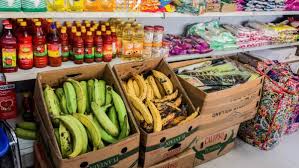What one gets in far too many Afro shops in Hamburg isn’t just bad customer service; it’s customer disservice at its most shameful display.
I speak of course not of every shop in town, the African barbershops and salons, for example, are often a treat. But if you ask me to recommend an African food shop for you, my answer will not be worth your effort in asking; I will tell you to go to whichever one you can find.
That is not because all of them are the same in terms of price and quality, but because nearly each one of them lacks good customer service. When a shop manager or assistant isn't monitoring you as though you were up to no good, he or she is busy being everything but polite and helpful.
Nearly every trip seems like an exercise in bad experience. Take last month, for example, when I informed an assistant at a Nigerian shop in Barmbek of a bag of Basmati rice I had bought from his shop that turned out to be Basmati in name only; ''This is my first time hearing this, I will check,’’ he said. Needless to say, he did not check then or any time since. On a separate occasion at the same shop, I had to wait for the cashier to finish a phone conversation before he could check me out. Then we discovered he did not have enough change to give me, which meant I had to wait while he checked every compartment there was in the store. After roughly ten minutes of waiting, I received my change, and to the door, I went. As I made my way home, I reflected on what had just transpired; the phone call, the dawdling, the lack of acknowledgment for the time I spent waiting, and the fact that that was just business as usual.
Then there is this shop located about 130 meters from the Barmbek train station. I was happy when it opened at the beginning of this year; I thought if nothing else, the fear of losing customers would force the other shop to improve its service. But my first experience there was equally discouraging; the cashier, who appeared to be a Ghanaian, had somehow forgotten to give me my change. When she finally did, her manner was more befitting of someone that was giving her money to a pestering beggar than a cashier handing change to a duly owed customer. 
What is so troubling about my experiences and those of friends isn’t the cavalier attitude or the condescension. Instead, it is the passing of bad human behavior as ‘good old African informality.’ The imbecility of it is that this behavior is prevalent in a place where it shouldn’t be, and is kept up even in this period of economic uncertainty. Black Africans might be just a fraction of Hamburg’s total population, but we represent nine out of the ten customers in any Afro shop at any given time. For those of us who have dedicated our lives to supporting our communities and restoring dignity to Black Africans, nothing is more demoralizing and bewildering than the actions of managers and assistants in Afro shops.
Unfortunately, this deplorable and economically irrational behavior is very familiar. Growing up in a small town in Ghana’s Volta Region, three kinds of people mostly constituted the middle class: government workers, bus or truck owners, and kiosk owners. Each neighborhood had about one or two sizable kiosks that one would frequent for items like tea bread, sugar, milk, and school supplies. The lack of competition in most neighborhoods made it easy for the shopkeepers to take most of their customers for granted. They would rather be obsequious to the bank employees and government workers who only occasionally bought from their shops than show even a modicum of appreciation for the rest of that went to them daily. But it didn’t end with the shopkeepers; in Ghana, there is hardly an area of life, including the church, where one can expect to be treated with the same level of respect and dignity accorded those perceived as rich or Whites from abroad.
Most of the shopkeepers of my childhood no longer run the neighborhoods; the wooden structures that once sheltered their egos have been washed aside by the less merciful tides of globalization and change. The current Coronavirus pandemic is also a tide of globalization, arguably the most brutal one we've seen in our lifetime. Will your local African food shops be able to withstand it? What will happen if the amazon of African foods and other basic supplies pops up suddenly on the internet; will you stay inside and order or will you continue to take the bus or train, with or without a mask, to an Afro shop in the name of solidarity? Who will benefit from that; you or the shopkeeper that treats you worse than those with whom you supposedly have less in common?
I will understand your choice, either way.
Mohammed Adawulai
Send your news stories to This email address is being protected from spambots. You need JavaScript enabled to view it. and via WhatsApp on 004917632140550












